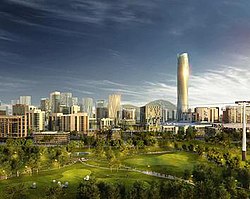Centenary City | |
|---|---|
City | |
| Centenary City [1] | |
 Rendition of the skyline of the Financial District, showing the dominating proposed Africa Tower | |
| Coordinates: 8°56′08″N7°17′36″E / 8.935445°N 7.293333°E | |
| Country | |
| Territory | Federal Capital Territory |
| Founded | 2014 |
| Incorporated | 2014 [1] |
| Area | |
• Total | 12.62 km2 (4.87 sq mi) |
| Website | |
| This project is currently under development | |
Centenary City is a planned city in the Federal Capital Territory in Nigeria. Centenary City is a master-planned development overseen by Centenary City FZE, as part of Nigeria's vision to create the city of the future smart city along the same lines as Dubai, Monaco and Singapore. The city is to be built from scratch on 1,260 hectares of virgin land located several kilometers southwest of Nigeria's capital, Abuja and five kilometers from the International Airport.
Contents
The concept of the city was conceived as a legacy project to mark the 100 year anniversary of Nigeria by January 1, 2014, during the administration of President Goodluck Jonathan. The city will have a mixed-use urban center, a central business district, a financial center, a museum and cultural center to promote African and global arts, world-class hotels, Grade A offices, residential districts, an 18-hole golf course, polo and country club, an international convention center, sports and leisure facilities, a safari Park, educational institutions, healthcare, and community amenities. [2] It is to be private-sector driven. [3]
Centenary City has been declared an Economic City and approved for Free Trade Zone (FTZ) status by Nigeria Export Processing Zone Authority (NEPZA). Centenary City is not the first FTZ to be licensed by NEPZA. There are over 30 FTZ operating in Nigeria approved by the government in order to boost the economy and attract foreign direct investments (FDI).

